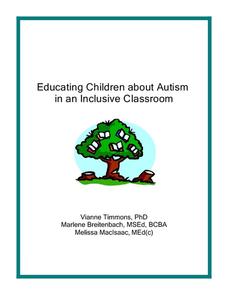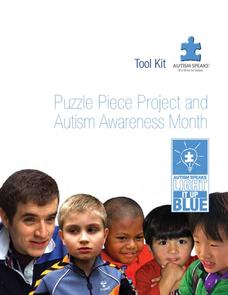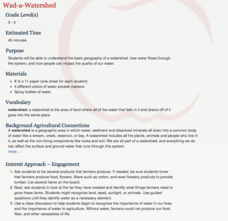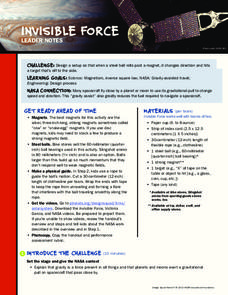Space Awareness
Sun, Earth and Moon Model
The moon orbits Earth while the Earth is rotating, and the Earth revolves around the sun. This can be a tricky concept for young astronomers. Implement an activity that helps distinguish between the movements of Earth's systems around...
Curated OER
Educating Children about Autism in an Inclusive Classroom
How do we meet the needs of learners with autism? Find out with an in-depth study that offers a thorough explanation of autism—what it is and how unique every individual's case may be, nine lesson plans spanning from kindergarten to 12th...
National Autistic Society
Autism Awareness
Planning activities for Autism Awareness Month? Check out the ideas in a packet designed to raise awareness of autism. Suggestions include plans for an assembly to launch a school-wide focus, lesson plans for classroom activities, and...
Classics for Kids
"Mars" from The Planets
Gustav Holst's The Planets provide young musicians an opportunity to examine how composers can create a suite: a collection of smaller pieces grouped to explore a single topic. After listening to "Jupiter," they examine "Mars" in detail,...
Teach Engineering
Aerogels in Action
Model an oil spill cleanup. An engaging engineering lesson has groups using aerogels to simulate an oil spill cleanup (vegetable oil in water). Along the way, they learn about nanotechnology and hydrophilia/hydrophobia.
ReadWriteThink
Acrostic Poems
What is an acrostic poem? It is one of the many forms of poetry that expresses a particular thought, idea, emotion, or feeling. Play with an interactive that allows young poets to craft a topical acrostic of their choice using an online...
Worksheet Web
Learning about Volcanoes
There's something about the classic volcano demonstration that can grab any learners' attention. Scholars begin with a reading and grand conversation about volcanoes, construct an erupting volcano using vinegar and baking soda, then show...
Autism Speaks
Puzzle Piece Project and Autism Awareness Month
Looking for ways to include your class members in Autism Awareness Month? Use a packet that provides several opportunities to include the student body in an important campaign.
Chicago Botanic Garden
Climate Change Around the World
Look at climate change around the world using graphical representations and a hands-on learning simulation specified to particular cities around the world. Using an interactive website, young scientists follow the provided directions to...
Chicago Botanic Garden
Recognizing Change (Observation vs. Inference)
What is the difference between making inferences and making observations? Young climatologists refer to a PowerPoint to make observations on each slide. They record their observations in a provided worksheet before drawing a...
Chicago Botanic Garden
Weather or Not
What is the difference between weather and climate? This is the focus question of a lesson that takes a deeper look at how weather data helps determine climate in a region. Using weather and climate cards, students decide if a statement...
Chicago Botanic Garden
Albedo, Reflectivity, and Absorption
What is reflectivity, and what does it have to do with the Earth's climate? As reflectivity is measured by albedo, scientists can gather information on Earth's energy balances that relate to global warming or climate change. Budding...
Chicago Botanic Garden
Understanding the Greenhouse Effect
Dive into the power of the sun with a two-part lesson. Budding scientists model the greenhouse effect in a hands-on activity, and then participate in a skit that explores the earth's energy balances and what really occurs in the...
Agriculture in the Classroom
Wad-a-Watershed
What kind of impact do humans have on watersheds? Find out in a lesson that defines, explores, and promotes ways to protect our watersheds. The ultimate goal of the lesson is for learners to discover how a watershed is impacted by...
National Institute of Food and Agriculture
Water Pollution Demonstration
Water pollution is everywhere, and pollutants range from oil to fertilizers. Bring the concept to life by demonstrating the difficulties in getting particular pollutants out of water.
Tech Museum of Innovation
Lighter than Air
Scholars participate in two design challenges concerning flight in the second instructional activity of the series. They design balloon crafts that have neutral buoyancy and forward motion.
Tech Museum of Innovation
Ant-Man Saves the Day
Provide Ant-Man with a flying device to aid in fighting crime. The first installment of a five-part unit has learners designing and building a flying device for Ant-Man. They write a narrative essay describing the engineering process...
PBS
Invisible Force
Investigate invisible forces. Young engineers design a setup that changes the direction of a steel ball using a magnetic force. The purpose of the setup is to model the gravitational pull of spacecraft by planetary bodies.
PBS
Inspector Detector
How do spacecraft detect magnetic fields? The fourth installment of a five-part unit has learners develop a device with magnets that allows for the detection of magnetic fields. They use a map of an imaginary planet to try out their...
PBS
Robo Arm
Future engineers create robotic arms like those on rovers built by NASA in the second lesson of the series. They test their devices by attempting to pick up and move cups to a specified location.
Tech Museum of Innovation
Launch It!
Launch a activity on flight with a challenging resource that asks scholars to first brainstorm and test ways to move a ping pong ball with given materials, then apply the results to design a launcher for them.
Tech Museum of Innovation
Hoop Glider Design Challenge
The fourth installment of a five-part unit has young engineers designing and testing hoop gliders. They adjust the ratio of the front loop and back loop of the glider to determine the best design for the longest flight.
Tech Museum of Innovation
Engineering Takes Flight
Groups explore concepts of flight by creating paper airplanes from different types of paper and testing their flight. They use the results to identify the optimal material.
Tech Museum of Innovation
Seed Dispersal
Engineering challenges are not just man-made ... nature has its own set of them. A hands-on STEM activity has groups designing a seed dispersal system. Each group can only use one sheet of paper — a tough task!

























